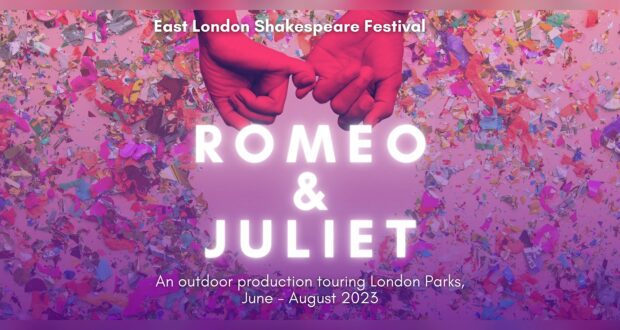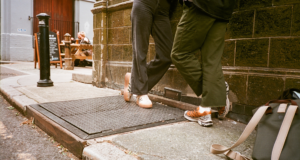We caught up with director Rosie Ward and Juliet herself, Emilia Harrild, to chat about the East London Shakespeare Festival (ELSF)’s production of Romeo & Juliet, which is touring London parks this summer.
Hi Rosie and Emilia, thank you for talking with us today. Could you share some insights into the show and what we can expect from it? And of course, fingers crossed for the good weather to continue!
Emilia: Our production is fresh, colourful, musical, original and funny – in spite of it being one of the bard’s most infamous tragedies. I think this is something we have been particularly keen to lift, not just to ensure it is a family-friendly production. It certainly hasn’t been something we’ve had to force however, as there is so much comedy in the text alone. Through these moments of laughter and authentic lightness, we have manifested the intensity of the friendships and relationships in the story that make them so true of a modern day reimagining. The comedy serves the truth, and so makes the unfolding tragedy even more poignant.
We are currently into our second show week and yes, the weather has been amazing, bar one slightly rainy show. Although, as is the nature of outdoor theatre, the elements, and how they can vary, definitely lend themselves to the atmosphere! For our Romeo & Juliet, there is certainly a gear change for all the characters in the second half following the deaths of Mercutio and Tybalt. It was from this moment in this particular show that it began to rain. The tension and energy was electric.
Rosie: Our Romeo & Juliet is set in modern day East London – we want the audience to recognise and feel like they are part of the world we have created. They should expect some audience participation, I’m afraid no one’s picnic is safe as Mercutio, in particular, has been known to pinch audience’s food!
The actors run pre-show mask-making workshops for 3-11-year-olds and during the Masquerade, Lord Capulet invites everyone to don their masks and join in the party; we’ve got some absolute bangers which audiences haven’t been able to resist singing along to.
The show is very musical, Emilia (Juliet) is a sensational cellist and Nick Hardie (Romeo) is a gorgeous guitarist, so as well as some well-known tracks (Dizzee Rascal, Lizzo, Gloria Estefan, Lizzo, Robbie Williams) audiences can also enjoy some stunning live music and original compositions, which Nick and Emilia recorded with our amazing Musical Director, Patrick Rufey.
The show is described as a departure from traditional outdoor Shakespeare. Could you elaborate on what makes this production unique and different from the usual Shakespearean performances we might be accustomed to?
Emilia: I would say that our show varies from other productions, in that our characters’ world context is one that pertains itself to London, and specifically, the East End. There is certainly a class dynamic that is integral to the antagonism between the Montagues and Capulets. Whereas the Montagues can trace their money and lineage back for hundreds of years, Lord Capulet has made his millions in the requisition and development of properties (and perhaps elsewhere…). It is within this divide that two self-professed social outcasts, Romeo and Juliet, are born and can share a kinship in their respective denouement of their societal constrains.
The young people – Romeo, Mercutio, Benvolio, Juliet and Rosalind – are all students at the same high school, with Juliet arriving as the new kid on the block. She is odd, outspoken and bookish, and her family’s heavy-footed integration into ELSF’s reimagined Verona is enough to make her a target for the popular kids: Rosalind and her hair-flicking posse. ELSF’s Romeo and Juliet is contemporary and truthful. This is also uniquely reflected in the casting. Sadé Philpotts, playing Lady Capulet/Benvolio, is around six months pregnant. This is a visual cue that has not been ignored. In fact it has served as a nuance and potential contention to Juliet’s relationship with her mother. The Capulets’ endeavour to build a new start is paralleled in the promise of a new life and, for Juliet, saying goodbye to her old life. The wonderful Ursula Early, in her portrayal of the Nurse, enshrines a reminder of this old life and a nostalgia for the tower blocks of Ilford.
Rosie: As well as the modern setting, the show has a physical language throughout, developed by our wonderful Movement Director, Carl Harrison. My background is in physical theatre and clowning, which has really supported the physical comedy moments that I believe are directed by the text, for example, the almost panto orchard scene where Romeo is hiding from Mercutio and Benvolio.
The balcony scene, which I have traditionally seen played as romantic, I have always read as a very funny scene and that’s what we’ve gone for, and audiences have been in stitches. The comedy really makes them fall in love with these characters, especially for our younger audiences, which makes the ending all the more poignant.
As Emilia touched upon, I think we have created a Romeo and Juliet who are relatable for modern audiences. Emilia is a remarkable Juliet, and has really tapped into that rebellious, darkly funny and strong young woman which I have always read from Shakespeare’s text.
In fact the whole cast is wonderful and the energy they bring to the production is electric.
It’s wonderful to hear that the performances will take place in so many local community spaces and involve members of the community in the cast, including singing, dancing, lines, and stage combat. What do you see as the main challenges and opportunities in incorporating community casting?
Rosie: I love working with our Community Casts, it’s one of the strands of ELSF of which I’m most proud. It gives us an opportunity to work with such a diverse skill set, for example our group this year includes a retired radio DJ, an NHS Senior Development Advisor, a carer, school students, a father and daughter, a film student… among others. Some of the Community Cast have never acted before and others are keen to take it more seriously, which is a lovely challenge for me to create an experience which is inclusive and enriching for all levels.
As well as ‘teaching’ set pieces, such as the fight choreo and the dances, they devised the second prologue as a group, and have created a really dynamic, funny and imaginative moment.
Emilia: I can say that having a Community Cast has only enriched what we have built. A Community Cast site-specific to East London has further cemented the vibrance and diversity that this area has to offer. With a range in ages and demographic that extends from the core cast of eight to the Community Cast, we are accurately portraying a slice of life and what the streets of East London actually look like. For theatre to work, the job of a company is to make the unbelievable believable. We have to make our audiences buy that the characters could viably do what they do with fair reason. This can be hard to achieve with such an infamous and token example of theatricality in Romeo & Juliet; a play where almost every audience member knows the outcome. Having an authentic Community Cast bolsters the intentions of the characters on stage and exaggerates the disparity between public and private moments. They transform the very public fight scenes in the play and hit home the tragedy of young death and gang violence with public funerals.
Emilia, we are curious if this is your first experience working in community theatre? How has the journey been for you so far, and what aspects of community involvement have stood out to you?
This is my first experience working with a Community Cast, but not in creating community theatre. As an actor, what you watch and experience is what you learn. I have loved learning from the Community Cast. Every member has offered something different to their roles and have lifted lines in ways that have surprised me. It has been equally humbling to see people who were perhaps more perceptibly nervous and quiet in early rehearsal sessions now making bold offers with confidence.
Rosie, as the director, what are the differences you’ve noticed between directing trained actors and community members? How do you navigate those differences while bringing everyone together?
Both casts have been tremendous and such a pleasure to work with. I worked with the professional cast full-time for an intense rehearsal period, and the Community Cast join us for two evenings and two weekend rehearsals. When they’re with us, we are just one big company. The professional cast are so welcoming and make sure the Community Cast feel integrated, supported and part of the team.
I suppose there is a technical short-hand with the trained actors, but I endeavour to treat the Community Cast like professionals – they join all our full vocal, physical warm-ups and we use industry terminology and have professional expectations. This gives the Community Cast a unique opportunity to experience a professional theatre company including the dedication required by the professional cast.
By the same token, the Community Cast bring so much to the pro-cast and the production as a whole. Tybalt, for example, has a whole posse of Capulets to support him, who he really misses when they’re not there!
Rosie, reflecting on the past couple of years of ELSF, could you share some highlights from the productions? How have the communities in London responded to these unique performances merging Shakespeare with contemporary culture?
Ursula (co-Artistic Director) and I started ELSF in the midst of the pandemic and our first production, A Midsummer Night’s Dream, coincided with a relaxing of restrictions; and because the shows are outdoors and audiences could easily socially distance, it felt like a safe way to enjoy theatre. Audiences were desperate for some creative respite, which only solidified my belief that theatre and the arts are integral to our wellbeing. It is also a joy to be able to work with and create work for creatives and actors.
A huge highlight is seeing the number of children and young people engaging with the show. In previous years, we have done comedies and children loved the magic of A Midsummer Night’s Dream and the comedy in Twelfth Night. So Urs and I were nervous to tackle a tragedy, but they have been hooked.
I will never get tired of audience members of all ages saying, “I’ve seen loads of Shakespeare productions, but this is the first time I really understood what was going on.” That is immensely humbling.
Finally, Romeo & Juliet offers a family-friendly experience where attendees can participate in mask making and enjoy picnics. The festival aims to create a vibrant and celebratory atmosphere. With pay-what-you-can performances, school matinees, family tickets and more, is it fair to say that one of ELSF main aims is to be as accessible and inclusive as possible and that this show really is for everyone?
Absolutely, the aim of the festival is to break down barriers to high-quality theatre. By bringing the production to people’s doorsteps and keeping ticket prices affordable, we hope that we’re removing obstacles such as expensive travel or the logistics of travelling to Central London if you have young children or are a wheelchair user, for example.
We aim to make the show itself accessible and understandable, regardless of age, whether English is your first language or if you’ve never experienced Shakespeare before.
I like to think if someone professes to dislike Shakespeare, then they will enjoy our production! It is funny, colourful, physical, musical, high-energy and dynamic, with a phenomenal cast. We hope to see you there!
Our thanks to both Rosie and Emila for their time to chat with us. More information on East London Shakespeare Festival’s Romeo & Juliet can be found here.
Romeo & Juliet plays
29-30 June at Hoxton Community Gardens, N1
5-9 July at Fellowship Square, E17 1
15-16 July at Wanstead Park, E11
21-23 July at Highams Park, IG8
27-30 July at Clissold Park, N16
2-3 August at Valentines Park, IG1
4-6 August at Hornsey School for Girls, N8
11-13 Aug at Springfield Park, E5
 Everything Theatre Reviews, interviews and news for theatre lovers, London and beyond
Everything Theatre Reviews, interviews and news for theatre lovers, London and beyond



